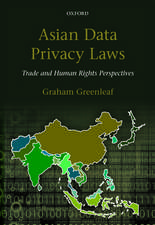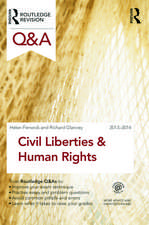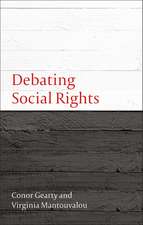The Fourth Amendment in an Age of Surveillance
Autor David Grayen Limba Engleză Hardback – 23 apr 2017
| Toate formatele și edițiile | Preț | Express |
|---|---|---|
| Paperback (1) | 239.27 lei 43-57 zile | |
| Cambridge University Press – 23 apr 2017 | 239.27 lei 43-57 zile | |
| Hardback (1) | 573.32 lei 43-57 zile | |
| Cambridge University Press – 23 apr 2017 | 573.32 lei 43-57 zile |
Preț: 573.32 lei
Preț vechi: 644.18 lei
-11% Nou
Puncte Express: 860
Preț estimativ în valută:
109.70€ • 114.85$ • 90.77£
109.70€ • 114.85$ • 90.77£
Carte tipărită la comandă
Livrare economică 07-21 aprilie
Preluare comenzi: 021 569.72.76
Specificații
ISBN-13: 9781107133235
ISBN-10: 1107133238
Pagini: 314
Dimensiuni: 158 x 235 x 21 mm
Greutate: 0.57 kg
Editura: Cambridge University Press
Colecția Cambridge University Press
Locul publicării:New York, United States
ISBN-10: 1107133238
Pagini: 314
Dimensiuni: 158 x 235 x 21 mm
Greutate: 0.57 kg
Editura: Cambridge University Press
Colecția Cambridge University Press
Locul publicării:New York, United States
Cuprins
Introduction: the dangers of surveillance; 1. Our age of surveillance; 2. The Fourth Amendment in the twentieth century; 3. Some competing proposals; 4. Fourth Amendment remedies as rights; 5. Constitutional remedies; 6. The Fourth Amendment in an age of surveillance; Conclusion: our Fourth Amendment utopia.
Recenzii
'An exciting and incredibly well-written investigation about the loss of privacy in America and the real dangers imposed by a surveillance state. This book is an eye-opener about where we are and where we might be going. The book is thoroughly researched and full of cogent and interesting argument. And most importantly it provides a path for greater protection of privacy that makes it a must-read.' Daniel J. Capra, Reed Professor of Law, Fordham Law School, New York
'Technology has so rapidly expanded the scope of government surveillance that current legal constraints on its use have become obsolete. In this book, David Gray proposes a completely novel yet conceptually elegant and eminently workable way of balancing the competing law enforcement and privacy interests at stake, all while remaining faithful to the text and history of the Constitution.' Christopher Slobogin, Milton Underwood Professor of Law, Vanderbilt University Law School, Tennessee
'With the publication of David Gray's trailblazing new work on the Fourth Amendment and the surveillance state, it is fair to say that 'the torch has been passed' to a new generation of American legal scholars - a generation 'unwilling to witness or permit the slow undoing of those human rights to which this nation has always been committed.' JFK can rest easy - the torch is in good hands.' Stephen Wm. Smith, United States Magistrate Judge
'David Gray's book is a comprehensive and insightful study of the role the Fourth Amendment plays in regulating and controlling the seemingly never-ending government surveillance of citizens. Gray's book goes back to the origins of the Fourth Amendment and discusses the myriad ways government today spies on individuals. This book is essential reading for anyone interested how government intrudes on constitutional privacy.' Tracey Maclin, Boston University School of Law
'This book is a welcome and informative contribution to the public debate about surveillance - a debate that will lastingly shape how we live together and how we understand privacy and liberty.' Matthew Feeney, The Weekly Standard
'Technology has so rapidly expanded the scope of government surveillance that current legal constraints on its use have become obsolete. In this book, David Gray proposes a completely novel yet conceptually elegant and eminently workable way of balancing the competing law enforcement and privacy interests at stake, all while remaining faithful to the text and history of the Constitution.' Christopher Slobogin, Milton Underwood Professor of Law, Vanderbilt University Law School, Tennessee
'With the publication of David Gray's trailblazing new work on the Fourth Amendment and the surveillance state, it is fair to say that 'the torch has been passed' to a new generation of American legal scholars - a generation 'unwilling to witness or permit the slow undoing of those human rights to which this nation has always been committed.' JFK can rest easy - the torch is in good hands.' Stephen Wm. Smith, United States Magistrate Judge
'David Gray's book is a comprehensive and insightful study of the role the Fourth Amendment plays in regulating and controlling the seemingly never-ending government surveillance of citizens. Gray's book goes back to the origins of the Fourth Amendment and discusses the myriad ways government today spies on individuals. This book is essential reading for anyone interested how government intrudes on constitutional privacy.' Tracey Maclin, Boston University School of Law
'This book is a welcome and informative contribution to the public debate about surveillance - a debate that will lastingly shape how we live together and how we understand privacy and liberty.' Matthew Feeney, The Weekly Standard
Notă biografică
Descriere
This book is an originalist rereading of the Fourth Amendment that reveals when and how contemporary surveillance technologies should be subject to constitutional regulation.


















